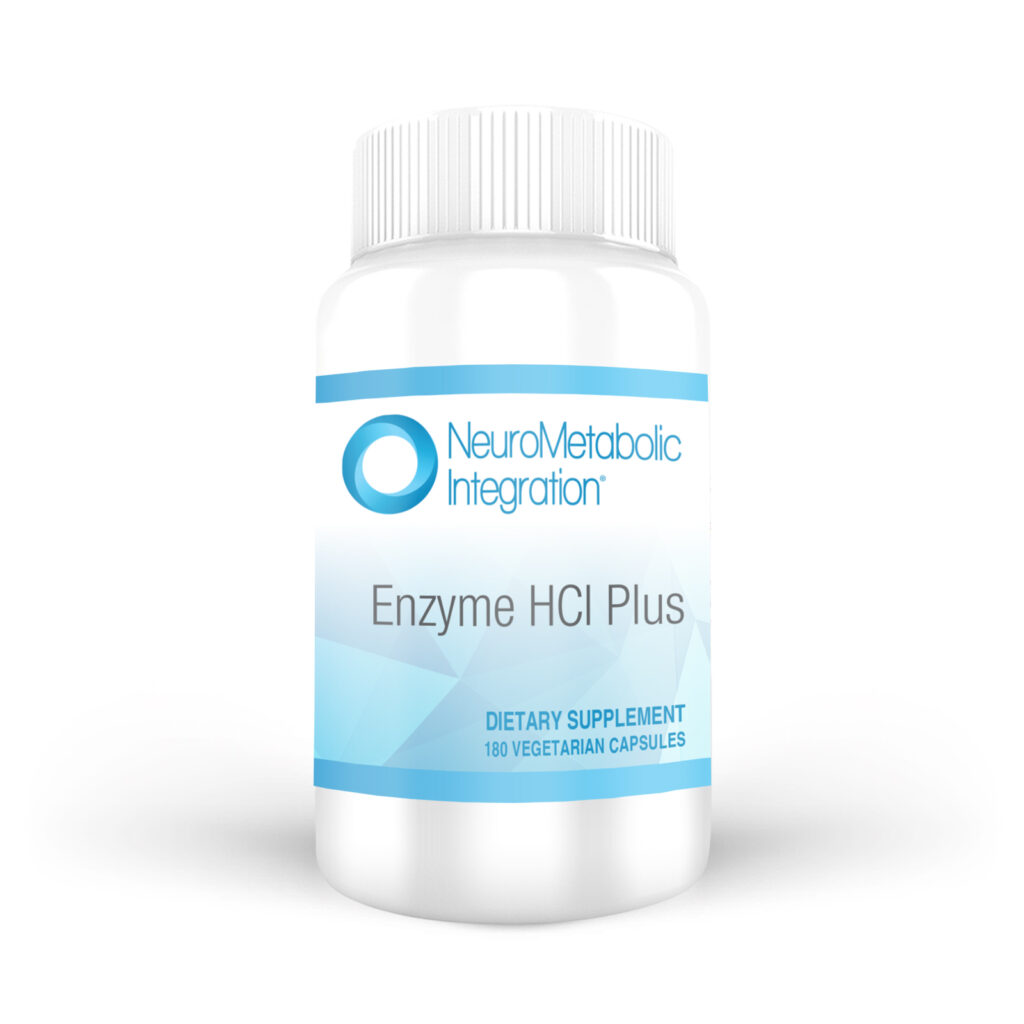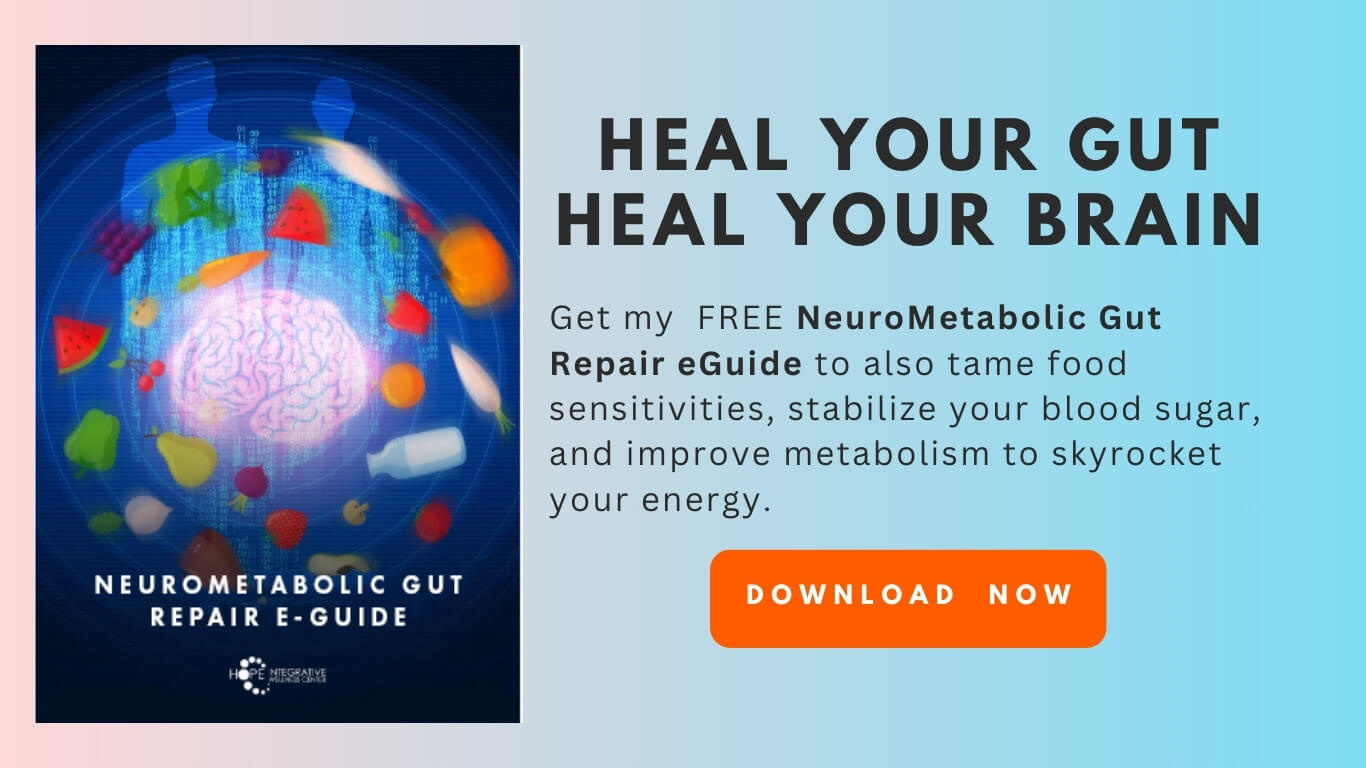3 Key Digestive Secretions to Optimize for Improved Digestion
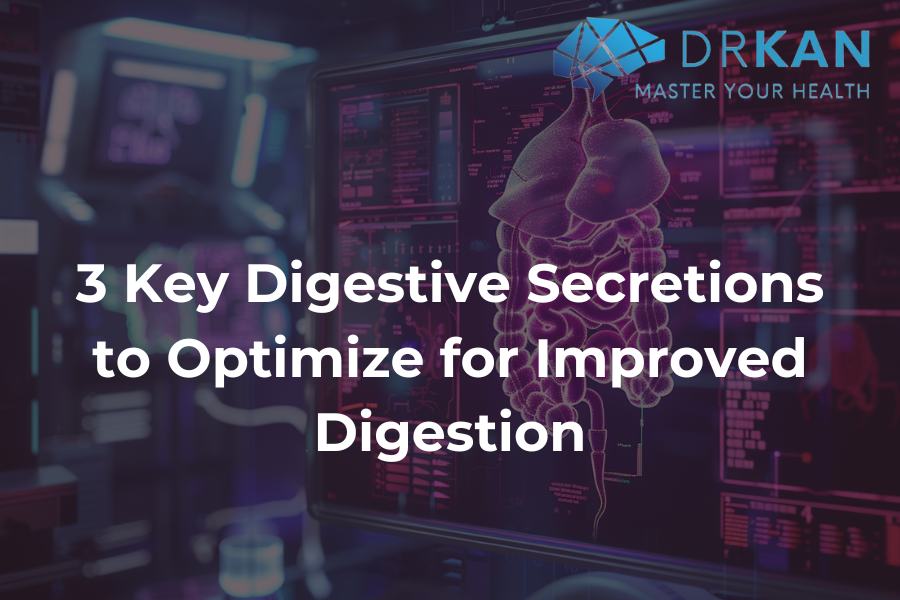
You put a lot of effort into finding the right diet, buying organic, perfecting your macronutrient intake. This is all well and good, unless you are not digesting and absorbing all the healthy food you are eating. They say, “You are what you eat.” But I say, “You are what you absorb!” Are you ready for improved digestion?
If you are not digesting and absorbing your food, it doesn’t matter how healthy and organic you eat. You are simply not going to benefit from the nutrients and heal your body!
So how do you make sure that you’re actually absorbing the nutrients in your food?
Read on to learn about 3 vital digestive secretions that must be working properly in order for you to improve digestion and absorb your food. You’ll also learn when you may need to supplement, and what to look for in a quality supplement.
The Trio of Digestive Secretions for Improved Digestion
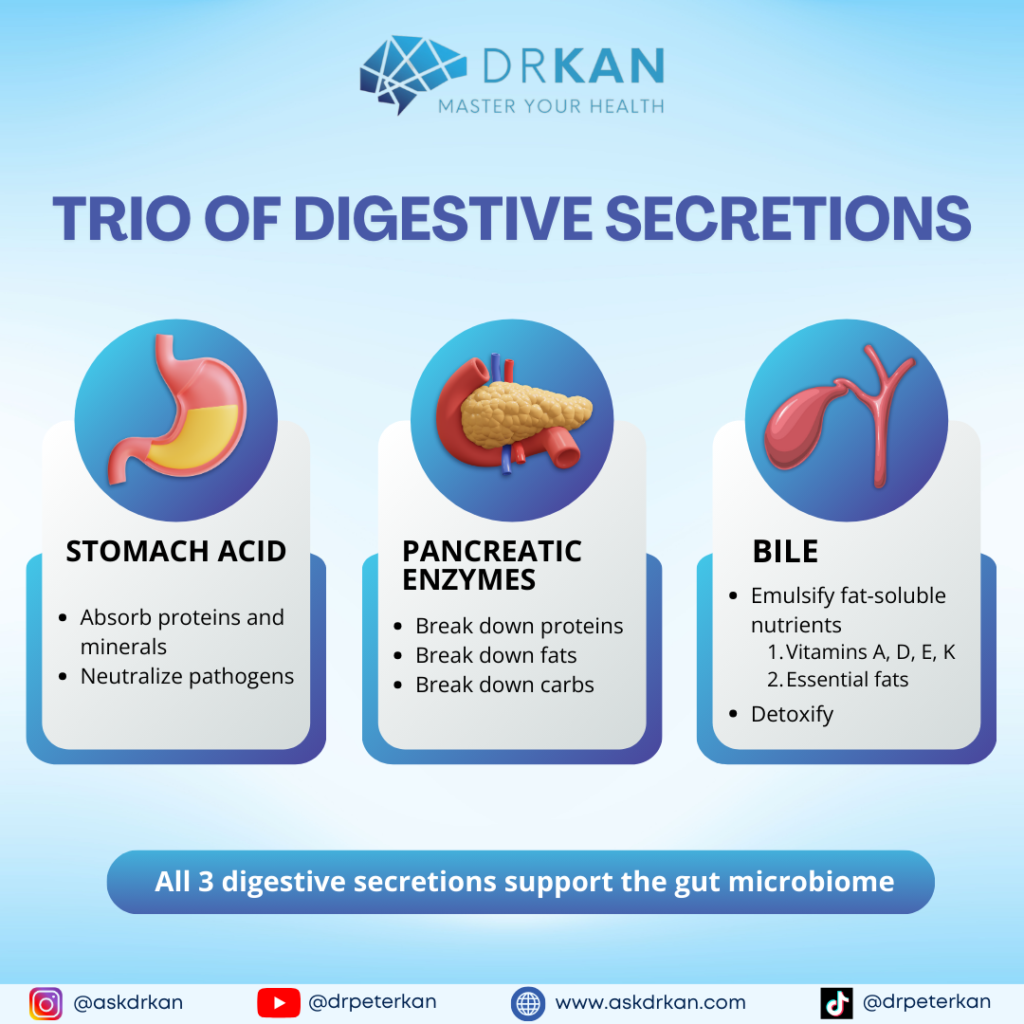
Central to this process of improved digestion are a trio of key digestive secretions: stomach acid, pancreatic enzymes, and bile. Each of these secretions have a unique job to do to help you break down different types of nutrients.
- Stomach acid is the first stage of breaking down protein and absorbing minerals. It primes the digestive system to release pancreatic enzymes and bile from the gallbladder. Stomach acid also helps you to neutralize microbes that you may have ingested. It serves as one of the first lines of defense against gut pathogens.
- Next, pancreatic enzymes such as lipase, protease and amylase, help you further break down proteins, fats, carbs, and fiber. Then you can absorb the broken down units of amino acid, fatty acids, and glucose.
- Finally, bile is produced by the liver and stored in the gallbladder. It is then released into the intestine to help you break down fat soluble nutrients (such as vitamins A, D, E, K) and essential fatty acids (such as omega 3 fatty acids).
But as we age, our body’s ability to produce these essential digestive secretions can decline due to a variety of reasons, potentially leading to a range of digestive issues.
5 Important Reasons Why Your Digestive Secretions May Not Be Up to Par
1. Aging and Stomach Acid
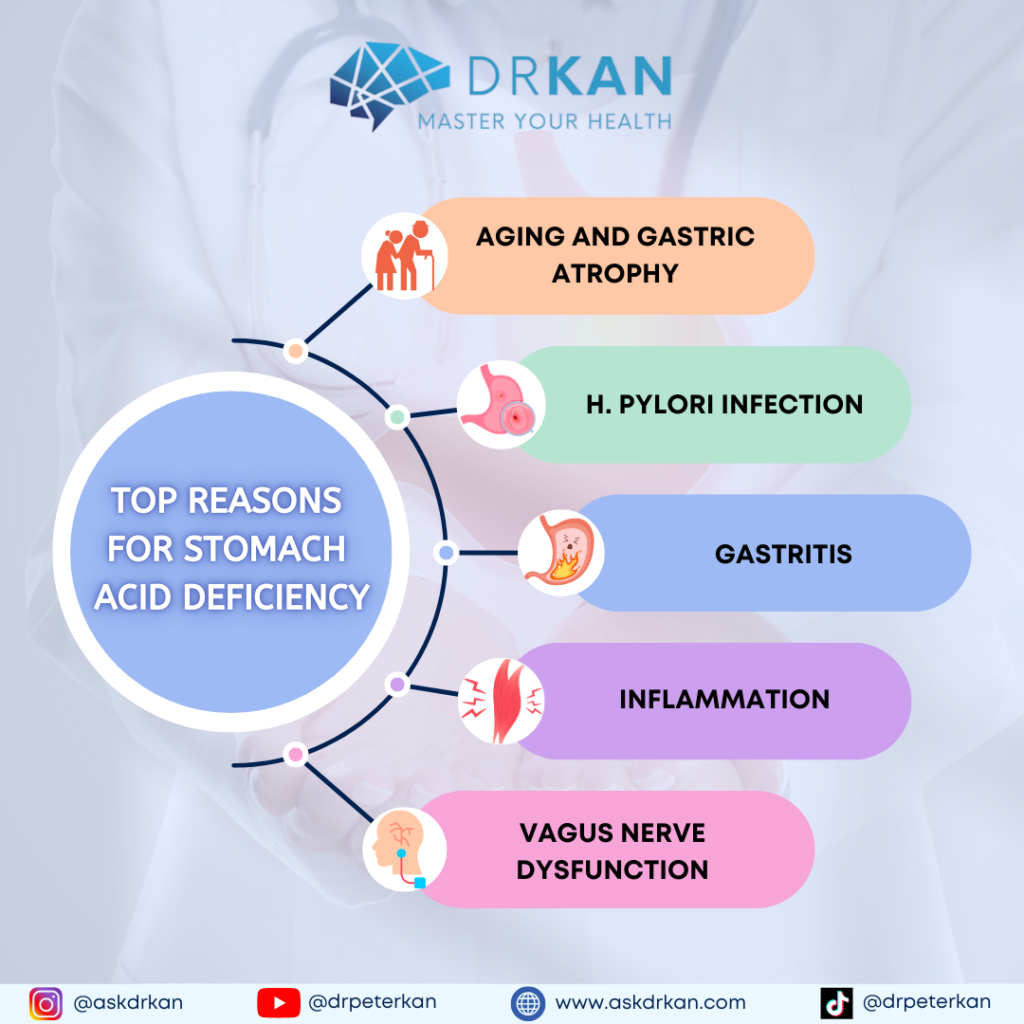
It was thought that aging caused a decrease in stomach acid production. More recent research actually showed that it’s not aging itself, but rather gastric lining atrophy that leads to low stomach acid production as we age.
Gastric lining atrophy is associated with factors like an H. pylori infection, which is a bacterial infection of the stomach that can shut down stomach acid production. H. pylori bacteria affect about 50% of the world’s population. As we age, immune system weakness can cause H. pylori to start causing low stomach acid conditions.
Chronic gastritis and other causes of chronic inflammation and stress can also decrease stomach acid production. Research finds that pepsin, Pepsin is an enzyme produced in the stomach that serves to digest protein, is decreased by 40% as we age.
So as we age, low stomach acid and stomach enzyme production is a common problem, leading to poor digestion.
2. Aging and Pancreatic Enzymes
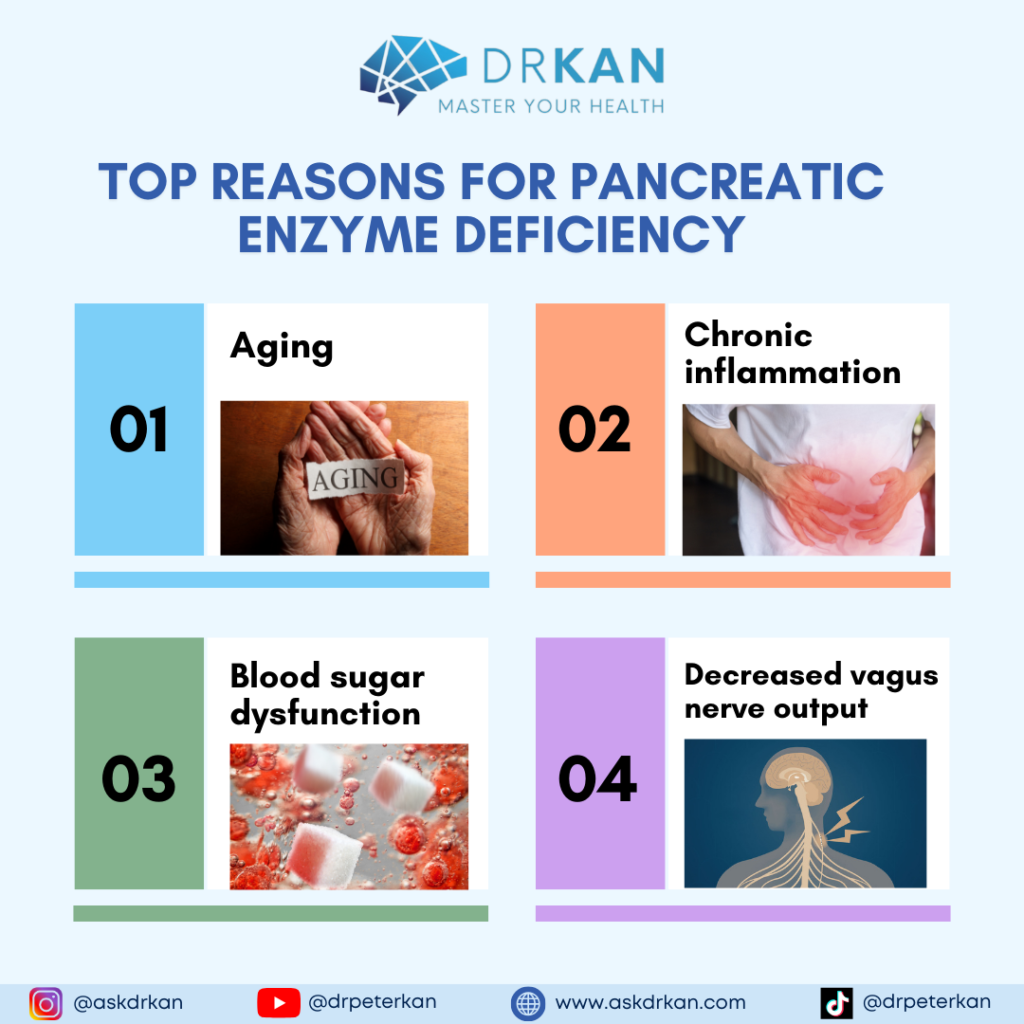
A condition called exocrine pancreatic insufficiency (EPI) is a medical condition where the pancreas’s production of enzymes is severely decreased. This causes severe malabsorption. Patients with EPI need enzymes in order to function properly. This is often caused by pancreatitis or pancreatic tumors.
EPI is a rare condition. However, in my functional medicine practice where I have helped over 6,000 patients overcome their chronic health conditions, sub-optimal pancreatic enzyme production is a very common problem, and it can be simply a byproduct of aging.
In one study, pancreatic enzyme secretion was measured in 180 normal control patients, free of abdominal and pancreatic disease, aged from 16 to 83 years old. Duodenal juice was collected after a single intravenous injection of secretin and CCK. Volume, maximal concentration and output of bicarbonate, lipase, phospholipase and chymotrypsin were measured.
All the enzymes that were studied linearly decreased in concentration as well as in output with age from the 3rd decade. So it is clear that our capacity to digest food starts to decline as we age.
Decreased pancreatic enzyme production can also be associated with a vagus nerve problem, chronic problems with blood sugar. This, in turn, causes stress to the pancreas and chronic inflammation that diminishes pancreas’s function.
3. Aging and Bile Flow and Secretion
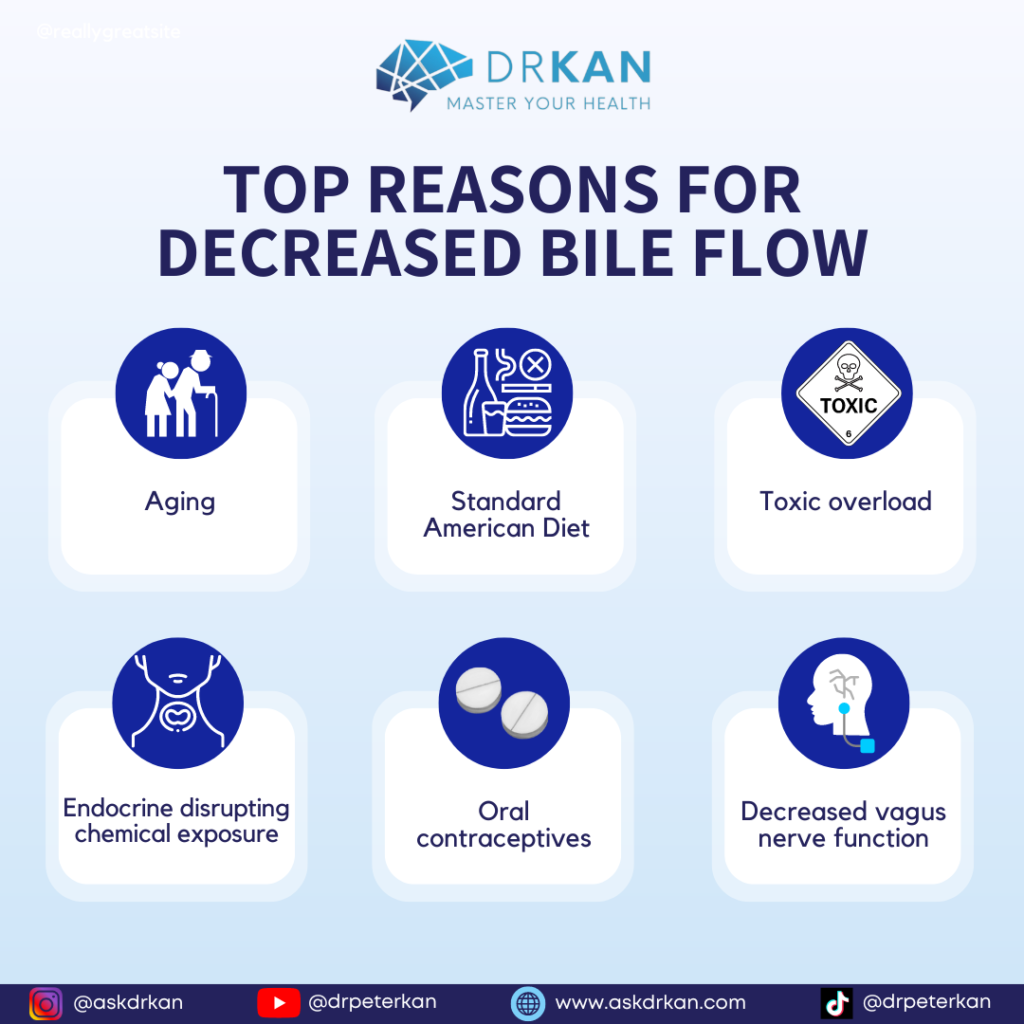
Produced by the liver and stored in the gallbladder, bile helps in emulsifying fats, helping to create improved digestion and absorption. Aging can lead to decreased bile flow and production, impacting fat digestion.
With animal studies, there was a significant reduction in bile flow and total bile acid secretion confirmed as the animals aged.
Decreased bile flow is a risk factor for developing gallstones. Gallstone formation is the highest around the 4th decade of life, especially in females who are still having menstruation. This highlights the importance of bile and hormone health, since bile is one of ways you detoxify toxins as well as hormones, especially in women.
Environmental toxin overload, poor diet, oral contraceptive use, and poor vagus nerve function can all impact gallbladder function and decrease bile flow and secretion, leading to decreased fat nutrient absorption, and decreased detoxification.
4. Food Sensitivity Reactions
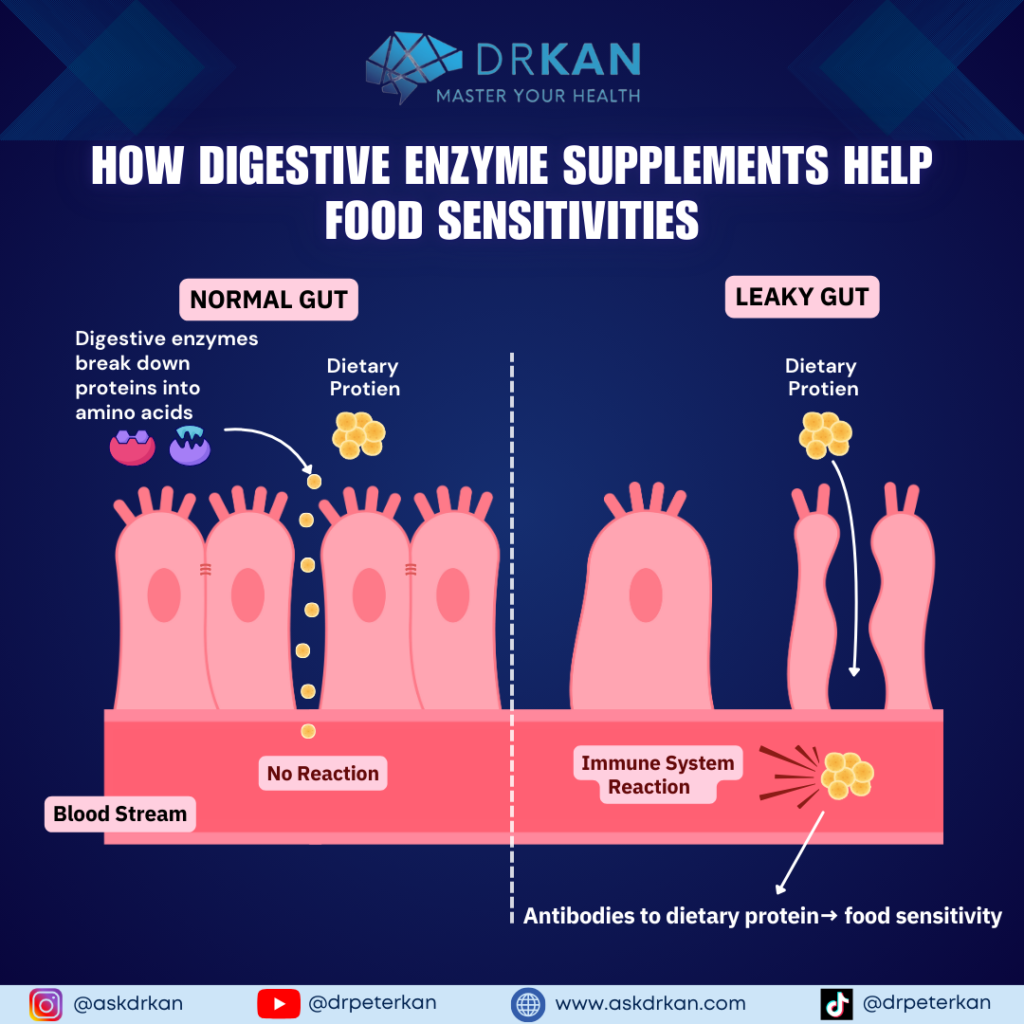
Taking digestive enzyme supplements may help you reduce food sensitivity reactions. With proper stomach acid and enzyme secretions, dietary proteins are normally broken down into their building blocks (amino acids). The amino acids are then absorbed in the small intestine into your bloodstream and delivered to your body where they are needed. Then your body will reconstitute the amino acids back into specific proteins needed for growth and repair.
However, if you don’t have proper digestive secretions to break down protein, and if you also have leaky gut (a condition where the tight junctions of your intestinal linings have become too permeable due to inflammation), then undigested proteins can leak through the leaky gut intact. Then your immune system encounters these intact dietary proteins, which are not supposed to be there. When that happens, your immune system may develop an antibody response to the protein, leading to food sensitivity reactions.
Taking a good digestive enzyme product (that also supports normal stomach acid) can help break the dietary proteins. This means there is less chance that these proteins can leak through leaky gut, thereby reducing food sensitivity reactions.
5. SIBO
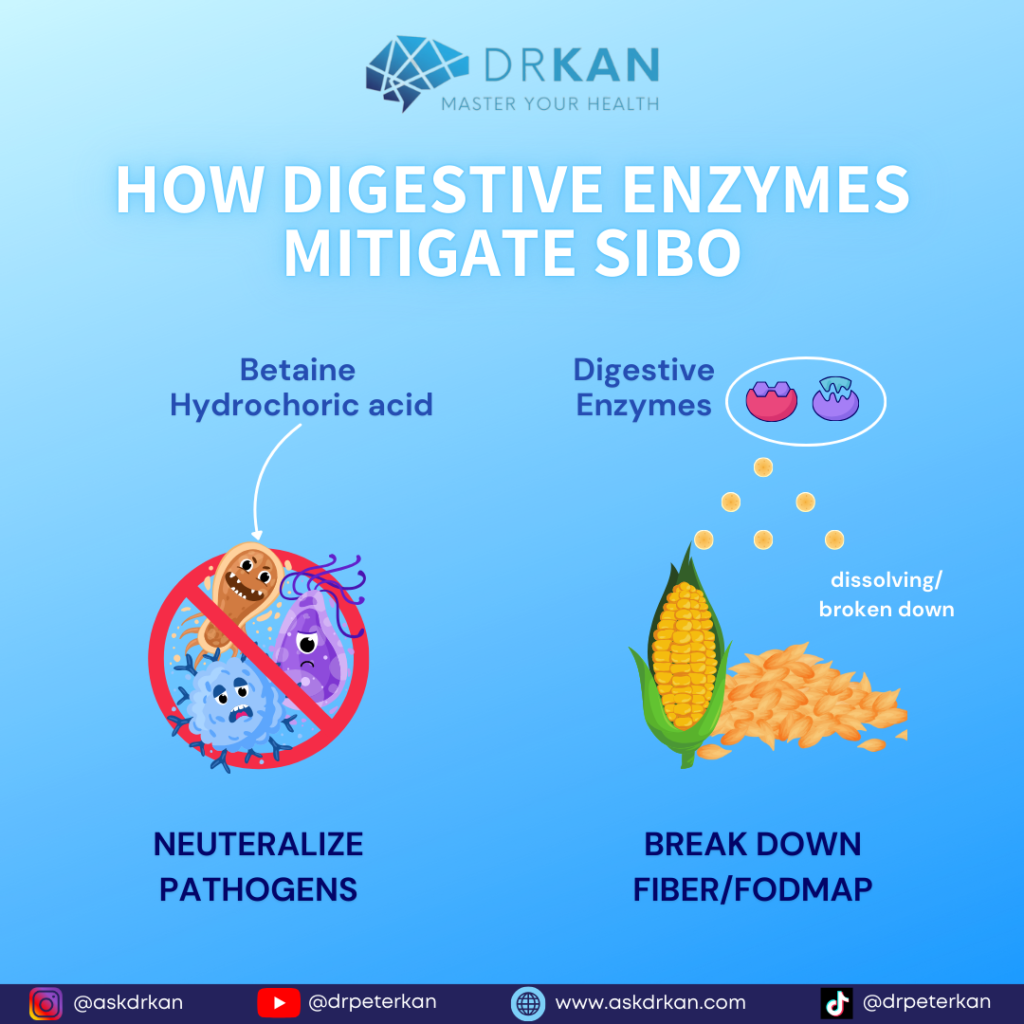
Small intestinal bacterial overgrowth (SIBO) is what happens when there are bacteria present in the small intestine where they are not supposed to be. As food is going down the GI tract, stomach acid and enzymes break down the food and get rid of pathogens as part of the normal digestive process. If however, you have low stomach acid, bacteria may start to overgrow due to lack of inhibition by the acid. Lack of enzymes may cause undigested food and FODMAPs to be fermented by bacteria. This causes the uncomfortable symptoms of gas and bloating. It’s also feeding the bacteria and causing overgrowth, which leads to more gut inflammation and gut dysbiosis.
Supplementing with stomach acid support and enzyme support may help to break down fiber and FODMAPs that can feed SIBO, thereby reducing symptoms of gas and bloating, and improve the underlying condition.
How to Choose the Right Supplements for Improved Digestion
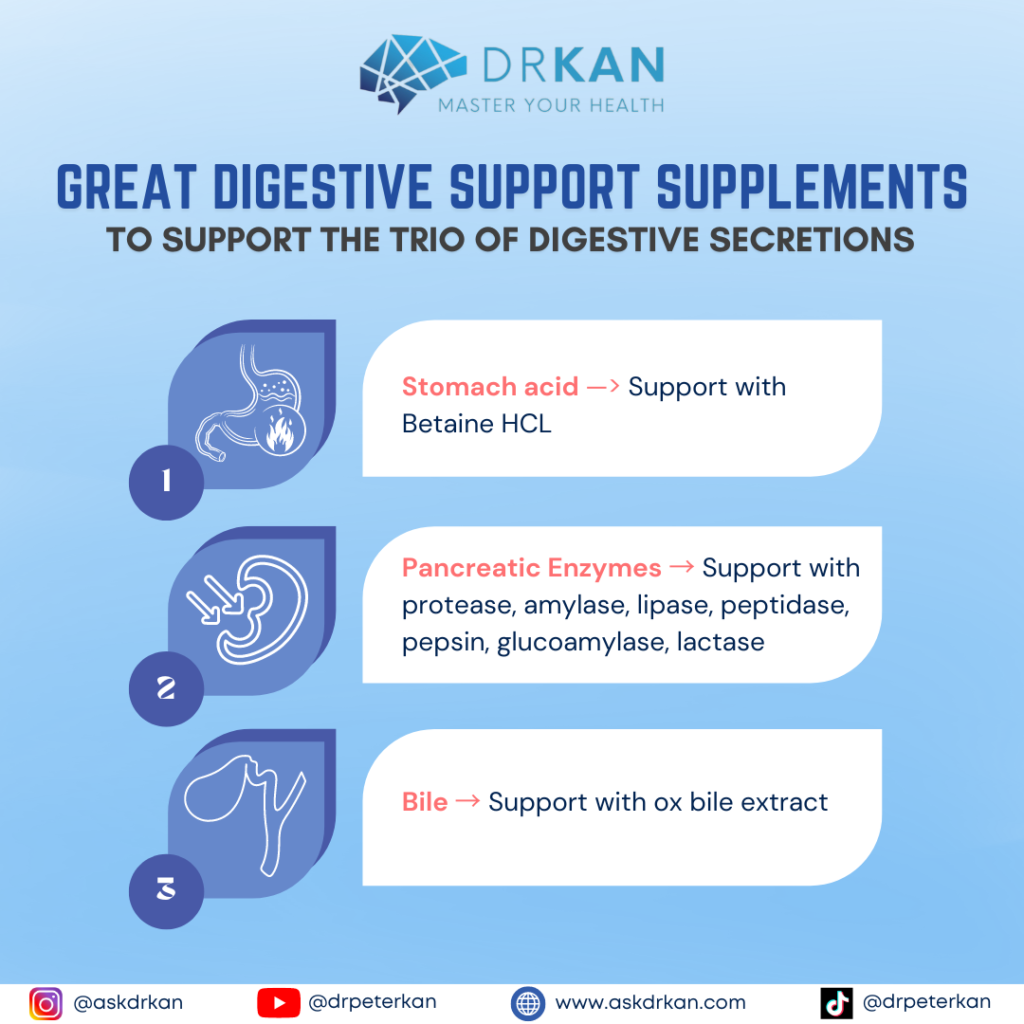
Now you know the 3 important digestive secretions and top 5 reasons why you need them! Next you will want to make sure that your digestive supplement contains all the ingredients that will support these areas.
Selecting high-quality, appropriate supplements is crucial for effective results and improved digestion.
Ingredients and qualities to look for include:
- Betaine hydrochloric acid: This is a natural substance that supports the normal acidity of the stomach. It is required for good protein and mineral absorption, as well as helping to neutralize pathogens with the acid.
- Pepsin: This is an enzyme produced in the stomach that helps with protein digestion. It has been shown to be reduced by 40% as we age!
- Lipase, peptidase, amylase, glucoamylase, invertase, and lactase: This is a good combination of pancreatic enzymes, and they help you break down proteins, fats, and carbs, including tough-to-digest fibers, and even lactose from milk.
- Ox bile: This has been traditionally used to support your body’s fat emulsification and fat nutrient absorption. And you definitely want to support bile function as well!
My favorite way to incorporate all the most essential components is to use Enzyme HCL Plus. This is a comprehensive digestive support that supports all 3 of the important digestive secretions: stomach acid, pancreatic enzymes, and bile support. It includes all of the ingredients that you would want in a perfect digestive support supplement.
The pepsin used in this product is in the form of DPPIV, which stands for dipeptidopeptidase IV enzyme. This unique form of enzyme has the ability to break down gluten protein and casein protein from cow’s milk, which may help those with gluten and casein sensitivity.
Integrating Supplements into Your Routine for Improved Digestion
Incorporating supplements into your daily regimen can optimize their benefits, but it’s important to follow best practices and recommended dosages.
It is best to take Enzyme HCL Plus around a meal time. You have some flexibility: you can take it 15 minutes before a meal, during a meal, or even 15 minutes after a meal. It’s more important that you take it consistently around meal time, then to worry about exactly when to take it.
Remember, it is not just about helping with improved digestion of protein, fats, and carbs. It is also helping reduce dietary protein exposure from leaky gut, which leads to food sensitivities. And it is also to help reduce SIBO symptoms if you have them. So take Enzyme HCL Plus with every meal, especially a protein-containing meal.
Recommended starting dosage is 2 capsules per meal. However, for someone with more severe enzyme and stomach acid deficiency, higher dosage may be needed to experience improvement. It is not uncommon for my patients to take 4 to 6 capsules or even higher per meal, depending what is needed to get results. You may want to experiment with different dosages to see what works for you.
Potential Digestive Reactions and Considerations
While supplements can offer significant benefits, there are situations where supplementing with betaine HCL and enzymes can create symptoms. An example would be if you have severe gastritis and/or stomach ulcer where your stomach lining is exposed and compromised.
Your stomach normally produces a special mucin layer that protects itself from its own acid. If that lining is compromised, your stomach lining would be exposed to its own acid, leading to burning and discomfort.
If you take a supplement that introduces more acid and you feel burning or discomfort in the stomach, it is not the supplement that is the problem. It actually means your stomach lining is compromised. In this case, you will want to heal the stomach lining first until you can tolerate more acid.
You can do this with GI Resuscitate, which is a supplement I use to help not only with leaky gut, but also to heal the stomach lining. You may also use natural compounds such as DGL, mastic gum, bismuth, and zinc carnosine to help heal the stomach lining.
If there is H. pylori infection, then you will want to reduce pathogen load either with antibiotic therapy, and/or in conjunction with natural anti-microbial herbs such as GI Detox Pro.
In fact, your ability to tolerate Enzyme HCL Plus tells you that your stomach lining is healing.
How Long Should I Take Digestive Supplements for Improved Digestion?
Duration varies based on individual needs and responses. However, based on the fact that digestive secretions decrease with age, ongoing supplementation may be necessary for some, especially if you experience digestion symptoms on the regular.
This is different from taking hormone replacement medications, which have a negative feedback loop and concerns about overdose and shutting down your own body’s production. Thankfully, digestive enzymes and stomach acid do not have a negative feedback loop. This means supplementation does not shut down your body’s production. I have many patients taking digestive support such as Enzyme HCL Plus ongoing and it has only benefited them long term.
Conclusion
Understanding and addressing the changes in our digestive system as we age is crucial for maintaining overall health. Ongoing assessment with an experienced functional medicine doctor may help you to determine your best supplement protocol for best results. Through strategic supplementation, we can support our body’s digestive processes, ensuring better nutrient absorption and overall well-being.
Ready to Dive Deeper to Improve Your Digestion?
We offer Zoom consultations to help you identify the root cause. We order functional medicine lab tests for you and design a customized eating plan, supplementation plan and detoxification plan to optimize health while reducing the dependency on medications.
If you’re struggling with chronic symptoms, and looking for root cause approach using a natural and holistic approach, please visit https://askdrkan.com/get-started for more information and to get started on the path to wellness.
References
Laugier R, Bernard JP, Berthezene P, Dupuy P. Changes in pancreatic exocrine secretion with age: pancreatic exocrine secretion does decrease in the elderly. Digestion. 1991;50(3-4):202-11. doi: 10.1159/000200762. PMID: 1812045.
Feldman M, Cryer B, McArthur KE, Huet BA, Lee E. Effects of aging and gastritis on gastric acid and pepsin secretion in humans: a prospective study. Gastroenterology. 1996 Apr;110(4):1043-52. doi: 10.1053/gast.1996.v110.pm8612992. PMID: 8612992.
Yakabi K, Sakurada T, Takabayashi H, Kani K, Kawashima J. [Change in function of gastric acid secretion by aging]. Nihon Rinsho. 2010 Nov;68(11):2001-5. Japanese. PMID: 21061523.
Bertolotti M, Gabbi C, Anzivino C, Crestani M, Mitro N, Del Puppo M, Godio C, De Fabiani E, Macchioni D, Carulli L, Rossi A, Ricchi M, Loria P, Carulli N. Age-related changes in bile acid synthesis and hepatic nuclear receptor expression. Eur J Clin Invest. 2007 Jun;37(6):501-8. doi: 10.1111/j.1365-2362.2007.01808.x. PMID: 17537158.
